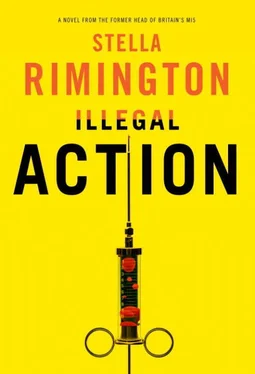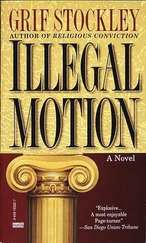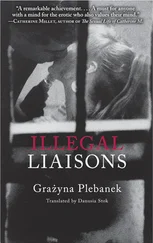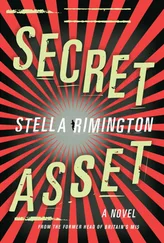At first Liz found it quite easy to keep track of where they were as they drove west through a succession of building sites and roadworks, but then, as they turned north, away from the coast and its influx of new money, she began to get confused. Gradually the villages became smaller, the roads narrower and more twisted and the cottages older. The few people they passed stared at the bulletproof limousine negotiating their narrow streets, and two pigs nonchalantly forced them to a halt on a mud-covered track on the outskirts of a town.
At last Simmons turned off a valley road and, carefully steering through a gap in an ancient iron boundary fence, drove on to a gravel drive. On either side was parkland, studded by huge oaks, with a dozen scraggy sheep grazing on the lush grass. Ahead, through gaps in the sentry lines of towering lime trees, Liz could see a vast grey stone Georgian house. Two enormous pilasters flanked the entrance, with wide stone steps leading up to the front door. Above the attic windows a balustrade ran the width of the house, and as they drew nearer, a side wing of Victorian brick came into view.
Simmons pulled the car to a halt on the gravel in front of the house, and got out to open the doors. As Liz stepped out she looked up into the chauffeur’s eyes, and they held hers meaningfully for a moment before he looked away.
What was that about? she wondered as she followed Brunovsky up the steps. The door was answered by a tall, thin old man in a frayed black jacket covering a dingy jumper, his face mottled purple by weather or drink. “Will you come in?” he said in a voice full of Ireland, and they walked into the hall. Four impressive Corinthian pillars soared up to the roof and a staircase swept up to a landing in an arabesque of stone. But the paint on the pillars was peeling like loose onion skins, and most of the floor’s tiles were cracked. It was cold, even colder than outside, and the strong smell of damp was as pungent as the salt air in a seaside town.
Liz walked behind Brunovsky into the drawing room, a long salon running across half the width of the house. She paused inside the door to take in the room—the ceiling decorated with plaster friezes of cherubim, family portraits on three of the walls and in the fourth long, vertical windows looking out over the terrace and overgrown formal gardens. Her attention distracted, she did not notice the young woman in a nurse’s uniform standing in front of the fireplace until she spoke. “Welcome,” she said. “I am Svetlana.”
“ Zdravstvujte ,” said Brunovsky, shaking her hand and they exchanged a few words in Russian.
Noticing Liz’s surprise the woman spoke in English. “Miss Cottingham is slightly indisposed today, though I hope she will join us later.”
“Is Harry Forbes here?” asked Liz. With Marco gone, he was the intermediary in this deal, if that’s what it was going to be.
A woman’s voice behind her said, “He is not well.”
Liz turned to see Greta Darnshof standing in the doorway. Her leonine blonde hair was tied back in a tight bun, and she wore a severe grey suit. In the cold light her fine-featured face seem hard, almost fierce. Greta advanced towards Brunovsky, ignoring Liz. She said, “I left Harry in the hotel. Everything has been prepared.”
Prepared? thought Liz. I thought we were here to see a painting.
“Come into the library,” said Greta.
She was speaking directly to Brunovsky, and Liz decided to use the opportunity to find a phone. In response to her question, Svetlana led her towards the back of the house, past a small sitting room, a cloakroom and finally the larder, until they came into an enormous kitchen. There among rows of copper pots hanging from hooks on the wall, opposite an enormous ancient Aga, its once white enamel stained caramel by years of cooking, hung a wall phone on a rickety bracket.
But when Liz picked up the phone there was no dial tone. Puzzled, she turned to the Russian girl and said, “It’s not working.”
Svetlana shrugged. “Sometimes it fails. We are quite remote here.”
“I’m sure. Do you have a mobile I could use?”
“No,” said Svetlana.
Since Greta’s unexpected appearance, Liz had begun to grow suspicious. This seemingly straightforward day had developed disturbing possibilities. Now this. How could this woman look after an invalid, if that’s what Miss Cottingham was, without a phone? Liz’s mind was whirling with questions. Was she deliberately being kept incommunicado? Whatever was going on here, she wasn’t going to show any disquiet to this woman. “Doesn’t matter,” she said cheerily. “Can you show me the library now?”
There was no sign of Brunovsky or Greta in the library, and Svetlana left Liz alone there. It was a windowless circular room in the centre of the house, lined with floor-to-ceiling shelves crammed with musty books. A wrought-iron staircase leading up to a walkway gave access to the higher shelves and a domed glass roof provided the only light. In one corner Liz saw the painting, mounted for viewing on a large easel, only half-illuminated by the weak light from the dome.
Liz was struck again by how closely it resembled the Pashko Brunovsky had bought. She looked at the thick strokes of its surface, then her eye was caught by the stain in its upper right corner. It was little more than a streak, which if she hadn’t known about the burst pipe would have struck her as the accidental swipe of a paintbrush. The pipe must have been rusty, otherwise why should a water stain be coloured? Intrigued, she looked intently at the mark and realised she could make out small granules—of what? Paint! This wasn’t water damage at all; this was paint. She listened for a moment, but heard no sound in the house; leaning forward she sniffed deeply, her nose almost touching the stain, and smelled the faintest aroma, a smell of lacquer, of glue, of aerosol spray.
Walking round the easel to the back, she saw that the canvas had been wrapped around a large wooden frame, its edges tacked down. In one corner a postage-stamp-sized piece of canvas flapping loosely gave Liz an idea. Rummaging in her bag, she found her nail scissors, and very delicately she snipped a sliver from the loose canvas and put it carefully into the inner pocket of her bag. No one here would notice, but back in London the Art Squad should easily be able to determine if the canvas was really a hundred years old.
“Usually people like to look at pictures from in front.” She jumped at the sound of the familiar voice, and, stepping round the easel, saw that Dimitri had come quietly into the room.
“What on earth are you doing here?” she asked with genuine astonishment. Had he seen her snipping off the bit of canvas? Probably not. He was smiling at her, though there was no warmth in his face.
“How could I resist the news of another Pashko?” he said, advancing towards Liz and kissing her formally on both cheeks. She noticed his leather jacket was spattered with rain. “And you are an extra bonus.”
“Have you just arrived?”
Dimitri nodded. “I have driven from Dublin.” He pointed to the painting behind her. “What do you think of it?”
Not bad, considering it was painted two weeks ago, Liz wanted to say, but wary now, not sure why Dimitri was there, she said only, “It’s very like Blue Field. ”
“Unsurprising,” said Dimitri. “They were painted within months of each other.”
“Are you sure of that?”
Dimitri looked at her, slightly quizzically. “It is impossible to be precise about the dates. But certainly it was the same year.”
Did he really believe this? She was not an expert, she couldn’t know for sure, but the circumstances around the painting’s rediscovery, the picture itself, all suggested it was a crude fake.
Читать дальше












